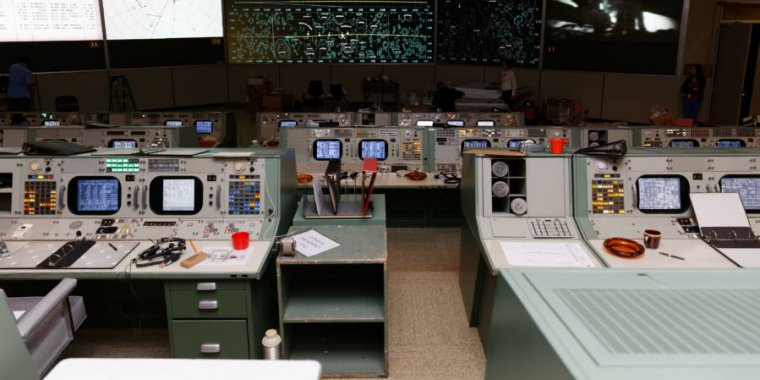
-
Standing at the top row of the MOCR looking forward. The consoles are all lit via internal LEDs powered by a Crestron commercial lighting system, and the positions are all dressed to appear as if the controllers had all gotten up mid-shift and walked out and left all their stuff behind.Lee Hutchinson
-
Looking toward the right of the room. There were still workers finishing the room setup while we were shooting.Lee Hutchinson
-
Standing at the far right of the top row near the DOD console looking left. Construction supplies visible at front.Lee Hutchinson
-
Compare the previous image to this pre-restoration picture of the room in 2012. Prior to restoration, the consoles were a mish-mash of Apollo- and shuttle-era panels in incorrect configurations, with no lighting or dressing.Steven Michael
-
Standing at the front right side of the room looking back at the rows of consoles. All had been removed and freighted to Kansas for careful restoration.Lee Hutchinson
HOUSTON—Following the completion of a multi-year, multi-million-dollar restoration, NASA's historic Apollo Mission Operations Control Room 2 ("MOCR 2") is set to reopen to the public next week. The $5 million in funding for the restoration was partially provided by NASA, but the majority of the money was donated by the city of Webster, the Houston suburb where the Johnson Space Center is located. Another half-million in funding came from the general public via a Kickstarter campaign (disclosure: your humble author was a backer).
For the past two years, historians and engineers from the Kansas Cosmosphere's Spaceworks team have been lovingly restoring and detailing the 1,200-pound (544kg) historic sage green Ford-Philco consoles that populated the control room—repairing damage from decades of casual neglect and also adding in the correct control panels so that each console now correctly mirrors how it would have been configured for an Apollo flight.Ars was invited to view the restored MOCR 2 last week as the final finishing restoration touches were still being applied. We conducted some interviews and shot some photos while technicians and construction workers bustled around us, hammering and screwing the last bits and bobs into place. The room's lighting system was in the process of being worked on, and the room flickered several times between fully illuminated daytime lighting and dim twilight—providing an even more accurate glimpse of what it might have looked like during an actual mission.
-
Standing at the right end of the "Trench," the first row of consoles. I shot several of these without a flash and adjusted the white balance so that the image closely mirrors the actual lighting tone in the room. It looks about like this—a little yellow-y and a bit dim.Lee Hutchinson
-
Long shot of row 2, the systems row, with the LM CONTROL console in foreground.Lee Hutchinson
-
Wide shot of the Trench from the midpoint, looking right across the FDO (Flight Dynamics Officer) and GUIDANCE consoles.Lee Hutchinson
-
A shot from the left of row 3, with the SURGEON console in foreground.Lee Hutchinson
-
Standing in the third row looking forward at the LM CONTROL console in row 2. CONTROL watched over much of the Lunar Module's hardware, including its radar and thrusters.Lee Hutchinson
-
Standing in the same spot looking a bit more left. Centermost console visible on the second row is TELMU, or "Telemetry, Electrical, and EVA Mobility Unit," responsible for watching over the Lunar Module's computer and software.Lee Hutchinson
-
Now looking far left. First row in background is the Trench, with all four positions (BOOSTER, RETRO, FDO, and GUIDANCE, left to right) are visible. Second row positions visible from left to right are EECOM, GNC, and TELMU.Lee Hutchinson
-
Now standing roughly center and looking forward at PROCEDURES (far left) and AFD (Assistant Flight Director, lower middle with gray stapler).Lee Hutchinson
How we got to now
Today, the Mission Control Center in JSC's Building 30 (renamed a few years ago to the "Chris Kraft Mission Control Center" to honor Christopher Columbus Kraft Jr., the person most directly responsible for defining how NASA's Mission Control would come to function) includes multiple Flight Control Rooms, referred to in NASA shorthand as FCRs ("fickers"). But during the Apollo era, there were two control rooms in the building—Mission Operations Control Room 1, on the second floor, and Mission Operations Control Room 2, on the third floor (referred to as MOCR 1 and MOCR 2, it's pronounced "mo'-ker"). MOCR 1 was only used for a few flights prior to the shuttle era and was primarily used for simulations and as a backup. MOCR 2, on the other hand, was where controllers sat and ran every Apollo flight except for Apollo 7. "The Eagle has landed" and "Houston, we've had a problem" both happened in MOCR 2. After Apollo, the room served as a shuttle FCR until 1992, when it was converted back to something resembling its early Apollo configuration and transformed into a tour stop. It was also used for other NASA events—personnel could book the room for meetings or show movies there. It was a frequent stop for VIP visitors and media who wanted to do something Apollo-related (Ars included, more than once!), and over the decades, the room slowly deteriorated. The carpet was stained and bare. The paint faded. And the consoles themselves, the objects of so much studious attention from generations of flight controllers, sat dark and silent. Random visitors could even run hands over the artifacts, casually pressing buttons and toggling switches that once perhaps were used for life-and-death purposes.But with the 50th anniversary of the Apollo 11 landing fast approaching in 2019, NASA finally had the ammunition it needed to push for the restoration—and now MOCR 2 shines like new.
Bagikan Berita Ini














0 Response to "NASA’s restored Apollo Mission Control is a slice of 60s life, frozen in amber - Ars Technica"
Post a Comment